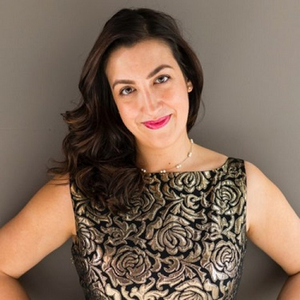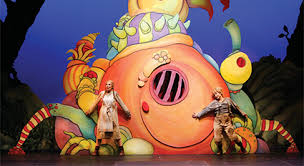Interview: Director Brenna Corner of San Diego Opera's HANSEL AND GRETEL

Brenna Corner started out with dreams of Broadway. It wouldn't be a big surprise if the versatile young director's dreams came true, but not in the way she'd originally pictured. I met with her to learn more about that and the San Diego Opera's upcoming production of HANSEL AND GRETEL.
"Broadway was the original idea when I was very, very little. I grew up in the theater, my mom's a costume designer. My dad was a carpenter in the shop. I just grew up loving theater. I lived in a little town in southern Alberta with a community theater that did amazing shows that I got to see, and I started to understand what a wonderful thing storytelling could be for the community."
Effective storytelling became the key focus of her subsequent career, which began at around the age of six with the role of a flower girl in TOSCA. "I was convinced that was the makings of my career. I had no idea what was happening in TOSCA , but I was so excited to wear that pretty dress and throw the flowers! I went on to study musical theatre and Shakespeare and was really torn between the two. I couldn't quite figure out which one was better. Someone said, have you heard of opera? It's Shakespeare and musical theatre at the same time. I was blown away, and it's been opera ever since."
Corner's passion for opera has led to work as director, actor, singer, choreographer and even certified member of Fight Directors Canada. I suggested the latter might mean I should be cautious with my questioning.
She reassured me. "The one thing Fight Directors Canada teaches us, you know, is how not to hit people. Make sure you always miss! So, you're probably safe."
No fights must be staged for HANSEL AND GRETEL, but the San Diego production does take advantage of the rest of her training and experience. Having both sung and acted, she has a better understanding of how performers think and what they will respond to. And her choreographic experience with body control is valuable because of the production's energy and life-size puppets. "There's a lot of running around, a lot of movement. Everything in the set moves--signs, animals, props, pictures, birds, hills, you name it. We had a lot of fun."
take advantage of the rest of her training and experience. Having both sung and acted, she has a better understanding of how performers think and what they will respond to. And her choreographic experience with body control is valuable because of the production's energy and life-size puppets. "There's a lot of running around, a lot of movement. Everything in the set moves--signs, animals, props, pictures, birds, hills, you name it. We had a lot of fun."
Though her background is varied, directing is now her primary focus, in no small part due to an auto accident that changed her life. Her injuries included damaged vocal cords. She was 17 and studying music and vocal performance at the University of Manitoba. "I really didn't know what I was going to do. I couldn't speak at all for several months. I can't sing. I can't go on stage. What am I going to do?" She was devastated. Although she could no longer perform, the university allowed her to complete a general music degree. But it hurt that she could no longer sing and act out the stories she loved telling.
"I couldn't give it up. I had to find a different way to do it. Then people started giving me these opportunities to direct, and I realized I loved helping singers understand their roles." She also loved the director's need to understand every aspect of a production and bring it all together. "It's crazy to say it, but the accident turned out to be a really good thing for me. I mean, because I've got all this training in classical theater, music and dance. It lets me come to each performer with an understanding of different ways you might think about a role, and we can talk in whatever way makes them the most comfortable, be that musically, be that movement, or be it story based.
"As a director it's always been very helpful to have been a performer. I think performing is the most amazing thing. You stand on stage in front of 3000 people and willingly lie to them, ask them to suspend disbelief while you tell a story. It takes an awful lot of courage. My job is to help the actors feel empowered so they can tell the story."
She does miss being on stage, if not the grind of learning and rehearsing that comes before. But now she gets great satisfaction from helping others perform well, and from audience reaction to the result.
Like so many opera professionals, Corner studied piano. Unlike most she said, "I grew up playing all sorts of instruments, at one point even the tuba. I've always been really interested in music. I'm told when I was really really little I would wander around the house, singing. I think it was predominantly Patsy Cline, Dolly Parton and Bruce Springsteen, sort of the house favorites."
As she got older she loved MAN OF LA MANCHA. "All I wanted to sing was Aldonza." Rodgers and Hammerstein were also on her playlist. But eventually the combination of music and Shakespearean plots drew her to opera. Her parents were supportive. "When I started getting into opera, the first thing my father asked for that Christmas was an opera 101 book, a sort of guide for dummies." He's read it, and now he and her mother travel from Canada when they can to see the productions she directs.
Corner's directing experience includes both traditional and modern opera--La bohème and CARMEN in addition to AS ONE and SCALIA/GINSBURG. When we spoke of favorite composers, Mozart was her first thought, and storytelling was again a major factor. She loves the depth of the characters and the plots and emotions that are so well supported by his music. When I suggested that modern opera can sometimes be more difficult to love, she agreed. "It can get stuck in being 'modern music.' I know I keep harping on this, but it has to tell a story." By being self-consciously "modern" it can fail to do that in a way that appeals to audiences.
Corner, to her surprise, now lives in Georgia. She was in a Young Artist position at the Glimmerglass Festival in New York when the Atlanta Opera called Glimmerglass looking for someone to fill a new Resident Assistant Director opening. She was recommended, interviewed a week later and got the job. "All of a sudden, I had a visa and was living in Georgia."
She's now in a relationship with someone there who knew little about opera when they began dating. Like her father, he decided to learn more. "He enrolled himself in a class," and now enjoys it.
Speaking again of contemporary opera Corner said, "I think standards are changing because the audience is changing. People watch television, stream and zoom in or whatever. Audiences want to be told stories in a slightly different way, and opera is changing accordingly. We created this production to have puppets because they tell the story in a different way.
There are these great moments when audiences agree to believe what's happening on the stage and the people on the stage agree they are going to be someone else. In a puppet world you not only make that agreement, you also agree not to see the person who's running around in the bird. You keep reengaging and really investing in the storytelling. Puppets make that happen and that's why we've used them."
But puppets do present a challenge for the singers. To produce unamplified auditorium-filling sounds operatic singers must use more of their bodies than pop singers do. The sometimes heavy costumes of operas such as TURANDOT and AIDA can make it more difficult to project one's voice.
 Life becomes even more challenging for performers if they sing from within a possibly even heavier puppet costume that they must learn to operate while singing. Our eyes go to what we want to talk about or who we're talking to. To make actions more believable a puppeteer must make sure his avatar does the same and correctly imitates dozens of other things we do without thinking about them. "Anytime it goes a little off, the audience may be distracted or see a different story than we intended. It's tricky." The production company added two professional puppeteers, and some of the life-sized puppets have a second person in them to share the weight and control some of the puppet's movements.
Life becomes even more challenging for performers if they sing from within a possibly even heavier puppet costume that they must learn to operate while singing. Our eyes go to what we want to talk about or who we're talking to. To make actions more believable a puppeteer must make sure his avatar does the same and correctly imitates dozens of other things we do without thinking about them. "Anytime it goes a little off, the audience may be distracted or see a different story than we intended. It's tricky." The production company added two professional puppeteers, and some of the life-sized puppets have a second person in them to share the weight and control some of the puppet's movements.
When speaking of projects she'd like to do in the future Corner said, "I've never had the opportunity to direct a piece of classical Shakespeare. JULIUS CAESAR is my favorite." One scene has special importance for her. "There's something about the scene after Caesar has died. Brutus speaks before Marc Antony's famous 'Friends, Romans, countrymen,' and what Antony says seems a sort of parody of Brutus's speech. If you stage it right, the audience understands the mob mentality that develops in that scene, how the listeners are swayed by Antony's rhetoric." Corner is fascinated by Shakespeare's ability to show so effectively that we should be careful about how we get information and how we react to it. That Antony's demagoguery remains effective in today's political world was left unsaid.
Corner believes that introducing opera to children is as important as finding new ways to meet modern audience expectations. "I have a down-sized version of HANSEL AND GRETEL that's touring Georgia schools, and it's designed to have some of the kids participate, sing roles or whatever. It was amazing to be at the first couple of shows to see how excited they were. And the questions they asked, some totally practical and some that showed how their imaginations had filled-in every gap."
Her enthusiasm for introducing children to opera is also clear in her description of the most satisfying moments of her career. "I got to direct a Glimmerglass summer production of NOAH'S FLOOD for their youth opera. It also used puppets. There was something about these 25 kids from the community and how much they invested and bought into it. It was one of those magical moments where everything clicked, and they did such an extraordinary job. I don't know if I've ever been quite so proud of a bunch of performers before."
What's next for Corner? "After this I go to Boston to do a show with the New England Conservatory, and then I'm debuting a new production of DON GIOVANNI at Glimmerglass. Then there's a production of Così fan tutte coming up." The storytelling continues.
HANSEL AND GRETEL will be performed February 8th, 11th, 14th and 16th at the San Diego Civic Theater. For time and ticket information visit the San Diego Opera website.
Photos compliments of San Diego Opera
Comments
Videos

